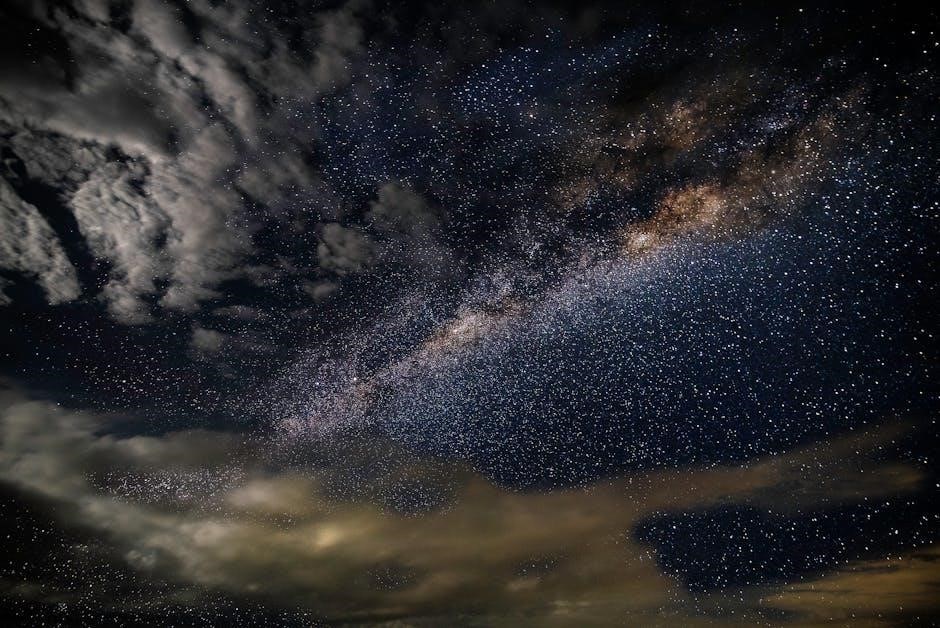The Hitchhiker’s Guide to the Galaxy, written by Douglas Adams, is a comedic science fiction series blending humor with profound philosophical questions about existence. It has become a cult classic, influencing pop culture and inspiring various adaptations.
Overview of the Book and Its Significance
The Hitchhiker’s Guide to the Galaxy, written by Douglas Adams, is a cult classic that masterfully blends humor with profound philosophical themes. The book follows the misadventures of Arthur Dent, a human saved by his alien friend Ford Prefect, as they travel through space after Earth’s destruction. Known for its witty satire and absurdity, the novel explores life’s meaning, technology’s impact, and humanity’s place in the universe. Its unique narrative structure and comedic style have made it a timeless favorite, influencing countless adaptations and cementing its legacy in science fiction literature.
The Concept of the Ultimate Answer (42)
The Ultimate Answer to Life, the Universe, and Everything is revealed as 42, calculated by the supercomputer Deep Thought after 7.5 million years. However, the actual question remains unknown, leaving humanity perplexed. This concept, central to The Hitchhiker’s Guide to the Galaxy, symbolizes the existential absurdity of seeking simple answers to complex questions. The number 42 becomes a metaphor for the futility of human endeavors to find ultimate meaning in an indifferent universe. Its iconic status has transcended the book, becoming a cultural reference point for the search for life’s purpose, often humorously or philosophically interpreted.

Major Themes in “The Hitchhiker’s Guide to the Galaxy”
Major themes include the absurdity of life, technology’s societal impact, and humanity’s insignificance in the universe, blending humor with philosophical questions about existence and human society.
The Absurdity of Life and the Universe
Douglas Adams masterfully explores the absurdity of existence through humor and satire. The book highlights the randomness of life, exemplified by Earth’s destruction for a hyperspace bypass. The search for the “Ultimate Answer to Life, the Universe, and Everything” being 42 underscores the futility of seeking meaningful answers in an indifferent cosmos. Characters like Marvin, the melancholic android, and the Vogons’ atrocious poetry further illustrate the absurdity of existence. These elements blend to create a narrative that mocks human-centric views of the universe, emphasizing its inherent chaos and unpredictability.
Technology and Its Impact on Society
In “The Hitchhiker’s Guide to the Galaxy,” technology is both a marvel and a source of chaos. The Infinite Improbability Drive exemplifies technological advancement, enabling faster-than-light travel through probability manipulation. However, its unpredictability often leads to unforeseen consequences. Marvin, the paranoid android, highlights the emotional detachment that can result from over-reliance on technology. The Vogons use advanced technology for bureaucratic destruction, symbolizing its misuse by those in power. The Hitchhiker’s Guide itself, an electronic guidebook, humorously critiques our reliance on technology for information. Earth’s destruction for a hyperspace bypass further illustrates the environmental and cultural costs of technological “progress.” These elements serve as a satirical commentary on society’s complex relationship with technology, emphasizing both its potential and pitfalls.
Humanity’s Place in the Grand Scheme
The book humorously explores humanity’s insignificance in the vast universe. Earth’s destruction for a hyperspace bypass underscores human irrelevance, while the Vogons’ bureaucratic indifference reflects cosmic apathy. The search for the Ultimate Answer (42) highlights humanity’s quest for meaning, despite the universe’s indifference. Marvin, the paranoid android, embodies existential despair, mocking humanity’s optimism. The Hitchhiker’s Guide itself, labeling Earth as “harmless,” further diminishes human significance. These themes use humor and irony to provoke thought about humanity’s place in an uncaring universe, urging readers to find meaning in absurdity.
Key Characters and Their Roles
Arthur Dent: An ordinary man surviving Earth’s destruction. Ford Prefect: An alien writer rescuing Arthur. Zaphod Beeblebrox: The charismatic, two-headed president. Marvin: A depressed android offering dark humor and existential insights.
Arthur Dent: The Reluctant Hitchhiker
Arthur Dent is an ordinary man thrust into extraordinary circumstances when his house is demolished to make way for a bypass. Rescued by his friend Ford Prefect, an alien writer for the Hitchhiker’s Guide to the Galaxy, Arthur embarks on a journey through space. His relatable struggles, humor, and resilience make him a symbol of humanity’s ability to cope with the absurdity of the universe. Arthur’s character represents the everyday person navigating unimaginable events, making him a heartwarming and relatable figure in the story.
Ford Prefect: The Alien Writer
Ford Prefect is an alien from Betelgeuse who works as a researcher for the Hitchhiker’s Guide to the Galaxy. Despite his humanoid appearance, he possesses advanced knowledge of the universe. Ford rescues his Earthling friend Arthur Dent moments before Earth’s destruction, showcasing his resourcefulness. His calm and matter-of-fact demeanor contrasts with Arthur’s chaos, providing both humor and guidance. Ford’s character highlights the themes of friendship and survival in an unpredictable cosmos, making him a pivotal figure in the story’s progression and a symbol of alien intelligence navigating human-like challenges.
Zaphod Beeblebrox: The Two-Headed President
Zaphod Beeblebrox is the charismatic and eccentric two-headed president of the galaxy, known for his charm, recklessness, and self-centered nature. One of his heads is more dominant, often leading to internal conflicts. As the stolen spaceship Heart of Gold’s captain, Zaphod drives the story’s adventure. His character embodies the book’s themes of absurdity and unpredictability, blending humor with a sense of cosmic power. Zaphod’s role is central to the narrative, showcasing Adams’ ability to create memorable, flawed, and uniquely alien characters that captivate readers and shape the story’s direction.
Marvin: The Paranoid Android
Marvin is the deeply depressed and paranoid android who embodies existential despair. His pessimistic outlook and witty sarcasm provide comic relief while exploring the meaninglessness of life. Marvin’s intelligence and awareness of his own misery make him a tragic yet hilarious character. Despite his gloomy nature, he plays a pivotal role in the story, often providing unintended assistance. His character serves as a satirical commentary on artificial intelligence and the human condition, making him one of the most memorable and relatable characters in the series.

Humor and Satire in the Book
The Hitchhiker’s Guide to the Galaxy masterfully uses humor and satire to explore absurdity, irony, and societal critiques. Adams employs wit to highlight life’s futility and cosmic indifference, blending laughter with existential questions. The book mocks bureaucratic red tape through Vogon poetry and hyper-efficient alien systems, while absurd scenarios like Earth’s demolition for a hyperspace bypass underscore humanity’s insignificance. Its clever satire not only entertains but also provokes thought on the human condition and the universe’s unpredictability.
The Use of Irony and Sarcasm
Douglas Adams masterfully employs irony and sarcasm to highlight the absurdity of life and the universe. The destruction of Earth for a hyperspace bypass, despite its inhabitants’ obliviousness, is a stark example of cosmic irony. Adams uses sarcasm to critique societal norms, such as the portrayal of Vogon bureaucracy, where inefficiency is celebrated. Even the supercomputer Deep Thought, which takes 7.5 million years to find the “Answer to Life, the Universe, and Everything,” underscores the futility of seeking ultimate meaning. Adams’ sharp irony and biting sarcasm create a humorous yet thought-provoking commentary on existence and human arrogance.
Parody of Science Fiction Tropes
The Hitchhiker’s Guide to the Galaxy cleverly parodies traditional science fiction tropes, turning them on their head with humor and wit. Adams mocks the seriousness often associated with the genre, such as the idea of a supercomputer (Deep Thought) spending 7.5 million years to find the “Answer to Life, the Universe, and Everything,” only to reveal it as 42. The Infinite Improbability Drive, a fantastical invention, is another example of how Adams pokes fun at sci-fi’s reliance on unexplained technology. By exaggerating these tropes, the book offers a fresh, irreverent take on the genre while maintaining its own unique charm and originality.
Cultural Critique Through Comedy
The Hitchhiker’s Guide to the Galaxy uses comedy to critique modern culture, tackling themes like bureaucracy, technology, and humanity’s flaws. Adams satirizes societal norms, such as the destruction of Earth for a hyperspace bypass, highlighting absurdity in decision-making. The Vogons, with their love of paperwork and terrible poetry, mock bureaucratic inefficiency. Even technology, like Marvin the android, serves as a humorous reflection on existential despair. By blending laughter with sharp commentary, Adams challenges readers to question the world around them, making the book both entertaining and thought-provoking.

Philosophical Questions Explored
The Hitchhiker’s Guide to the Galaxy delves into existential themes, questioning the meaning of life, the universe, and everything. It explores chance, probability, and morality in an indifferent cosmos.
The Meaning of Life, the Universe, and Everything
The Hitchhiker’s Guide to the Galaxy famously reveals that the “Answer to the Ultimate Question of Life, the Universe, and Everything” is 42. This revelation, computed by the supercomputer Deep Thought over 7.5 million years, highlights the futility of seeking simple answers to life’s profound mysteries. The book humorously critiques human arrogance, suggesting that the pursuit of meaning may be as absurd as the answer itself. The destruction of Earth to build a hyperspace bypass further underscores the insignificance of human existence in the grand cosmic scheme, blending philosophy with Adams’ signature wit.
The Role of Probability and Chance
The Hitchhiker’s Guide to the Galaxy explores the concept of probability and chance as a driving force in the universe. The Infinite Improbability Drive, a key plot device, relies on manipulating probability to enable faster-than-light travel. This reflects Douglas Adams’ comedic take on the unpredictability of life, where chance events often dictate outcomes. Arthur Dent’s survival, for instance, is a result of improbable coincidences. The book humorously critiques determinism, suggesting that even the most unlikely events can shape reality, emphasizing the chaotic and unpredictable nature of existence in a vast, indifferent universe.
Morality in an Indifferent Universe
The Hitchhiker’s Guide to the Galaxy delves into the concept of morality within a seemingly indifferent universe, where cosmic events unfold without regard for human ethics. The book suggests that morality is not inherent to the universe but is instead a construct of conscious beings. Characters like Arthur Dent, grappling with existential crises, must create their own meaning and moral frameworks. This theme is underscored by the contrast between the universe’s randomness and the characters’ attempts to find purpose, highlighting the resilience of moral compasses in a chaotic, uncaring cosmos.
The Hitchhiker’s Guide as a Narrative Device
The Hitchhiker’s Guide to the Galaxy functions as a narrative device, offering comedic insights and essential information while its flawed reliability enhances the story’s humor and unpredictability, aiding the plot’s progression;
Structure and Tone of the Guide
The Hitchhiker’s Guide to the Galaxy is structured as an electronic guidebook, blending humor with essential information for intergalactic travelers. Its tone is irreverent and satirical, often poking fun at bureaucratic inefficiencies and cosmic absurdities. Entries are concise yet witty, reflecting the Guide’s philosophy of practicality over profundity. The Guide’s voice is both authoritative and playful, making it a unique narrative device that complements the story’s comedic and philosophical undertones. Its unreliable nature adds layers of irony, as it frequently omits critical details, mirroring the chaos of the universe it describes.
Its Role in Shaping the Story
The Hitchhiker’s Guide to the Galaxy serves as a central narrative device, offering insights into the universe while driving the plot forward. Its entries often provide critical information, albeit with a comedic twist, influencing the characters’ decisions. The Guide’s tone and content reflect the absurdity of the cosmos, mirroring the story’s themes. Its unreliable nature adds tension, as characters like Arthur Dent must navigate the galaxy with incomplete or humorous guidance. This dynamic between the Guide’s practicality and its whimsical inaccuracies shapes the story’s progression, blending humor with existential exploration. Its role is both informative and narrative, enhancing the tale’s unique charm.

Iconic Moments and Quotes
The destruction of Earth, Vogon poetry, and the Infinite Improbability Drive stand out as unforgettable moments, blending absurdity and wit to define the story’s enduring charm.
The Destruction of Earth
The destruction of Earth, as depicted in The Hitchhiker’s Guide to the Galaxy, occurs to make way for a hyperspace bypass. This event sets Arthur Dent’s journey in motion, highlighting humanity’s insignificance in the vast universe. The demolition, carried out by Vogons, underscores the book’s themes of bureaucratic absurdity and existential irrelevance. It serves as a catalyst for Arthur’s adventures, introducing readers to the comedic yet poignant exploration of life’s meaning. This iconic moment encapsulates Douglas Adams’ unique blend of humor and philosophy, resonating deeply with audiences.
Vogon Poetry and Bureaucracy
Vogon poetry is notoriously described as the third worst in the universe, serving as a form of psychological torture. Its grotesque imagery and lack of rhythm make it unbearable, as experienced by Arthur Dent during his encounter with the Vogons. This reflects the bureaucratic coldness of the Vogons, who prioritize efficiency over empathy. Their role in demolishing Earth for a hyperspace bypass embodies the book’s critique of soulless administration. The Vogons’ love for red tape and meaningless procedures highlights Douglas Adams’ satirical take on bureaucracy, blending humor with a bleak view of cosmic indifference.
The Infinite Improbability Drive
The Infinite Improbability Drive is a fictional faster-than-light propulsion system central to the story. It operates by manipulating probability fields, allowing ships to traverse vast distances instantaneously. This concept, while absurd, highlights the book’s blend of humor and sci-fi innovation. The drive’s unpredictability often leads to chaotic outcomes, mirroring the universe’s inherent randomness. Its invention by a super-intelligent being underscores the theme of improbable solutions to cosmic challenges; This imaginative device becomes a metaphor for the power of creativity and the absurdity of existence, making it a memorable element of the Hitchhiker’s universe.
Legacy and Adaptations
The Hitchhiker’s Guide to the Galaxy has spawned radio dramas, TV series, films, and stage plays, cementing its status as a cultural phenomenon. Its witty dialogue and unique storytelling continue to inspire new adaptations and influence global pop culture, ensuring its timeless appeal to audiences of all ages.
Radio, TV, and Film Adaptations
The Hitchhiker’s Guide to the Galaxy has been adapted into various mediums, starting with a 1978 radio series that launched its cult following. A 1981 TV series brought its quirky humor to screens, while a 2005 film starring Martin Freeman and Mos Def introduced the story to a new generation. Each adaptation has retained the book’s essence, blending satire and science fiction to entertain audiences worldwide. These adaptations have further cemented the story’s legacy, ensuring its timeless appeal across different formats and generations.
Influence on Pop Culture
The Hitchhiker’s Guide to the Galaxy has left an indelible mark on pop culture, inspiring countless references in music, film, and literature. Phrases like “Don’t Panic!” and “The Answer to Life, the Universe, and Everything is 42” have become ingrained in popular lexicon. The book’s unique blend of humor and philosophy has influenced comedians, writers, and scientists alike. Its impact is evident in TV shows, video games, and even technology, with concepts like the “Infinite Improbability Drive” sparking creative thinking. The series continues to connect fans worldwide, proving its enduring relevance and cultural significance.
Modern Relevance of the Book
The Hitchhiker’s Guide to the Galaxy remains remarkably relevant in contemporary times, offering timeless insights into humanity’s existential struggles. Its exploration of technology, bureaucracy, and the absurdity of life resonates with modern audiences grappling with rapid technological advancements and societal complexities. The book’s humor and satire provide a coping mechanism for life’s uncertainties, while its philosophical musings encourage readers to question their place in the universe. Its themes of adaptation, resilience, and the search for meaning continue to inspire new generations, cementing its status as a cultural touchstone.
The Hitchhiker’s Guide to the Galaxy masterfully blends humor with profound philosophical inquiries, exploring life’s complexities and humanity’s place in the cosmos. Its influence on pop culture remains undeniable, ensuring its timeless relevance.
Final Thoughts on the Book’s Impact
The Hitchhiker’s Guide to the Galaxy has left an indelible mark on literature and pop culture, inspiring countless adaptations and fostering a loyal fan base. Its unique blend of humor, satire, and philosophical inquiry continues to resonate, offering readers a fresh perspective on life’s mysteries. The book’s ability to balance absurdity with profound questions ensures its relevance in modern times, making it a timeless classic that transcends generations.



